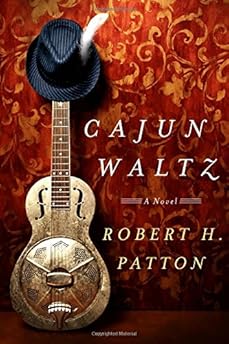« older | Main Largehearted Boy Page | newer »
June 27, 2016
Book Notes - Robert H. Patton "Cajun Waltz"
In the Book Notes series, authors create and discuss a music playlist that relates in some way to their recently published book.
Previous contributors include Bret Easton Ellis, Kate Christensen, Lauren Groff, T.C. Boyle, Dana Spiotta, Amy Bloom, Aimee Bender, Jesmyn Ward, Heidi Julavits, Hari Kunzru, and many others.
Robert H. Patton's Cajun Waltz is an engaging novel that spans three generations of one family in southwest Louisiana.
Booklist wrote of the book:
"Patton's novel is raw and atmospheric...mesmerizing [in a] way that readers won't be able to stop turning the pages."
In his own words, here is Robert H. Patton's Book Notes music playlist for his novel Cajun Waltz:
True to its title, Cajun Waltz highlights the music and culture of southwest Louisiana in the middle decades of the 1900s. There are accordionists, guitarists, fiddlers, and harp players among its characters, and the songs they play, dance to, and hear on the radio are as entwined within their daily lives every bit as deeply as today's digital tracks are entwined within our own. Along with a few numbers that, for me, capture the region's quirky and occasionally violent grit, my playlist includes some period tunes specifically featured in the book, the artists long-gone Cajun and blues pioneers revered by fans of American roots music but pretty much forgotten by everyone else. Primitive by modern production standards, it's something you either like or you don't. I don't listen to it every day—but when I do, it offers a fresh reminder of the gut emotion and innate virtuosity that compels great art in all its forms.
"Crawfish Fiesta" (Professor Longhair) – This piano instrumental by the late great Professor Longhair has the infectious bounce of Cajun Waltz's family patriarch, Richie Bainard. Richie's a Texan originally and the tune is pure New Orleans, but it speaks to his lifelong lust for good times at any cost.
"Keep Your Lamps Trimmed and Burning" (John Fahey) – If I could model my own guitar playing after anyone's, it'd be Lightnin' Hopkins or John Fahey. Fahey doesn't really stretch out here, but his arrangement of Reverend Gary Davis's tune has, again, a nice New Orleans pulse thanks to its horn rhythm section.
"On Top of the World" (Hackberry Ramblers) – The Ramblers formed in 1933 and blended musical traditions of Louisiana Cajuns and East Texas cowboys. Many have recorded this song, including Cream and Keb' Mo'. When played slow, it comes across like a junkie's defiant preference for good drugs over bad love. Sped up by the Ramblers, it's a rollicking dance tune.
"J'ai Passe Devant Ta Porte" (Dewey Balfa, Marc Savoy, D. L. Menard) – This is one of my favorite Cajun waltzes. Listening to it makes it easy to imagine a ramshackle dance hall packed with revelers on a hot Gulf night during the Depression. Fights might erupt outside, but inside people are grinning.
"Nobody Knows You When You're Down and Out" (Jorma Kaukonen and Jack Cassidy) – This chestnut by Jimmy Cox is one of the Depression's most iconic songs. Cajun Waltz begins in hardscrabble Louisiana in 1928. In many ways the fortunes of the novel's Bainard clan improve from there. And in many ways they don't.
"Allons a Lafayette" (Joseph Falcon and Cleoma Breaux) – Recorded in New Orleans in 1928, the song and its two performers play a big part in Cajun Waltz. It's a buoyant tune with a bleak lyric—which is to say, it's Cajun.
"Oberlin" (Amédé Ardoin) – Amédé Ardoin, the model for Cajun Waltz'sWalter Dopsie, was murdered in the 1930s for letting a white woman wipe his brow with her handkerchief after a show. Somehow you can hear his fate in his voice.
"Stagger Lee" (Professor Longhair)" – A barrelhouse boogie about coldblooded violence. Hey, it's Louisiana.
"Baby and the Gambler" (Savoy Family Band) – I haven't sat down and translated the French lyrics. It doesn't matter. This swampy ballad sung by Ann Savoy is plain beautiful.
"Crawling King Snake" (Big Joe Williams) – A blues standard, this version figures directly in Cajun Waltz. Two half-brothers playing a scratchy 78 on an old Philco player in the attic of their home on the shores of Lake Charles—it's a lovely moment from which nothing good will come.
"St. James Infirmary" (Snakefarm) – Snakefarm's Songs From My Funeral is a haunting collection of reinterpreted traditional ballads. Their version of "St. James Infirmary" is strange, daring, and dark – yet you can't listen to it without tapping your foot. I like to think Cajun Waltz might prompt a similar reaction in readers.
"Adieu False Heart" (Linda Ronstadt and Ann Savoy) – This song is about a woman stronger than the lover who abandons her. Fiddles, accordions, a fingerpicked guitar, and the lush harmonies of two amazing singers. A perfect way to say adieu.
Robert H. Patton and Cajun Waltz links:
the author's website
excerpt from the book
also at Largehearted Boy:
Support the Largehearted Boy website
Book Notes (2015 - ) (authors create music playlists for their book)
Book Notes (2012 - 2014) (authors create music playlists for their book)
Book Notes (2005 - 2011) (authors create music playlists for their book)
my 11 favorite Book Notes playlist essays
100 Online Sources for Free and Legal Music Downloads
Antiheroines (interviews with up and coming female comics artists)
Atomic Books Comics Preview (weekly comics highlights)
guest book reviews
Librairie Drawn & Quarterly Books of the Week (recommended new books, magazines, and comics)
musician/author interviews
Note Books (musicians discuss literature)
Short Cuts (writers pair a song with their short story or essay)
Shorties (daily music, literature, and pop culture links)
Soundtracked (composers and directors discuss their film's soundtracks)
weekly music release lists
Word Bookstores Books of the Week (weekly new book highlights)






